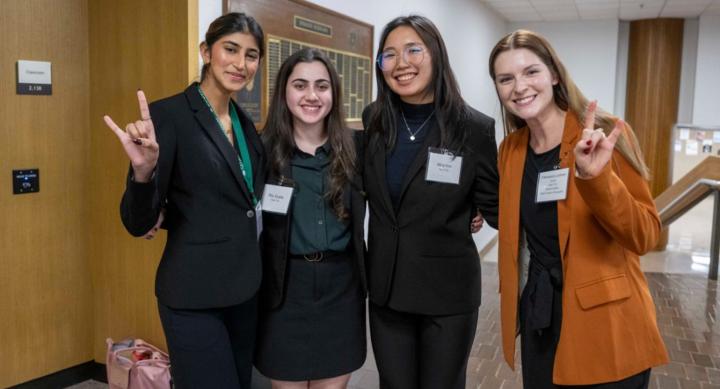
Minji Kim, second from the right.
AI is an undeniable truth in 2025: it’s the subject of investor meetings, media rhetoric, and Hollywood spectacle. Underneath the glamor and fame, AI and language model research continues every day through academia and industry—including at the University of Texas at Austin.
Enter Minji Kim, an informatics senior and NobleResearch scholar whose approach to computer science and data science stems not from coding, but from something else entirely: ethics.
“Informatics is about the intersection between people, information, and technology,” Minji said. “The idea of making information accessible really appeals to me because I feel that having social impact with what you do is important.”
She continued, “What I talk about wanting to do after graduation is creating impactful solutions using machine learning that is helpful to a community.”
To this effect, Minji has already begun supporting the local community through human-centered digital projects and client work.
Working with the Texas Cybersecurity Clinic, a pro bono program led by professor Francesca Lockhart, Minji has already shipped cybersecurity solutions for businesses and organizations across Austin, Texas.
“I’m a big sucker for things that will impact society in a good way,” Minji said. As part of Girls Who Code, Minji works to extend the reach of data science education by mentoring freshmen and high school students in professional skills and coding principles.
“Last year’s theme was AI and predictive modeling,” Minji said. “We got paired up with Rouse High School, and we had workshops where we would talk about predictive modeling, and then the rest of the session would be about questions they had about UT Austin or anything general about college.”
Perhaps the most notable of Minji’s accomplishments comes in her own tiny vision language model research here at UT, conducted in collaboration with Dr. Abhijit Mishra, UT Austin postgrads, and alumni. This project was supported by an Undergraduate Research Fellowship through the Office of Undergraduate Research.
“The project that I worked on is a privacy-preserving tiny vision language model,” Minji said. “It’s like a ChatGPT application… but ChatGPT uses the cloud, which could pose privacy risk issues, with like a user putting in passport information… our project was to make it self-sufficient on a user device.”
With such an active engagement in research and the community, it may seem as though informatics was always Minji’s plan for her college education. Like many uncertain freshmen who walk onto campus for the first time, Minji needed to set her aim first.
“I felt like I was lost my freshman year, but the interdisciplinary studies that informatics is really helped me figure out what I wanted to do at the end,” Minji said.
“They give you so many options to figure out what you want to do in the first year,” she continued. “It was a great opportunity for me, to figure out what I wanted to do, because I pivoted a lot during high school.”
Thinking about her career so far, Minji also credits her professors Mishra and Francesca Lockhart for focusing her study at UT.
“Dr. Mishra’s focus on the ethics of AI really appealed to me. His work on projects that are focused on user privacy preservation techniques was really impactful to me and made me think ‘What work can I do with AI and machine learning skills that I’ve learned that can be beneficial to society?’”
“Professor Lockhart leads the Texas Cybersecurity Clinic,” she continued. “She helps students get experience while helping communities, and that was really inspiring to me…that shaped my career.”
Now in her last year as a Longhorn, Minji preps herself for a career that marries her loves of cybersecurity and machine learning, all the while remaining steadfast in an ethical, human-centered approach.

